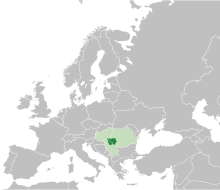Banat
Banat
| |
|---|---|
Historical region | |
 Map of the region of Banat | |
| Coordinates: 45°42′00″N 20°54′00″E / 45.7000°N 20.9000°E | |
| Country | |
| Largest city | Timișoara |
| Area | |
| • Total | 28,526 km2 (11,014 sq mi) |
| Population (2011 est.) | |
| • Total | 1,700,000 |
| • Density | 60/km2 (150/sq mi) |

Banat (UK: /ˈbænɪt, ˈbɑːn-/, US: /bəˈnɑːt, bɑːn-/;[1][2] Hungarian: Bánság; Serbian: Банат, romanized: Banat) is a geographical and historical region in Central and Eastern Europe. It is a part of three countries. The eastern part is in western Romania, the western part of Banat is in northeastern Serbia, and a small northern part is in southeastern Hungary. The region is mostly populated by ethnic Romanians, Serbs and Hungarians.
Geography
[change | change source]
Banat is the part of the Pannonian Basin with the Danube to the south, the Tisza to the west, the Mureș to the north and the Southern Carpathians to the east.[3] Banat has an area of 28,526 km². Romanian Banat has an area of 18,966 km², Serbian Banat has an area of 9,276 km², and Hungary 284 km².[4]
Romanian Banat is mountainous in the south and southeast. In the north, west and southwest it is flat and sometimes marshy.[3]
References
[change | change source]Citations
[change | change source]- ↑ "Banat". Merriam-Webster.com Dictionary.
- ↑ "Banat". Collins English Dictionary/Webster's New World College Dictionary.
- ↑ 3.0 3.1 Rusu, Raularian (2007). Organizarea spațiului geografic în Banat (PDF). Timișoara: Mirton. ISBN 978-973-52-0201-9. Archived from the original (PDF) on 2023-03-27. Retrieved 2023-06-03.
- ↑ Bizerea, Marius (1975). "Banatul, ca unitate și individualitate istorico-geografică în cadrul pământului locuit de români". Tibiscus. Etnografie. Timișoara: Muzeul Banatului: 7–25.
Sources
[change | change source]- Bataković, Dušan T., ed. (2005). Histoire du peuple serbe. Lausanne: L'Âge d'Homme. ISBN 9782825119587.
- Bocșan, Nicolae (2015). "Illyrian privileges and the Romanians from the Banat" (PDF). Banatica. 25: 243–258.
- Ćirković, Sima M. (2004). The Serbs. Blackwell Publishing. ISBN 0-631-20471-7.
- Engel, Pál (2001). The Realm of St Stephen: A History of Medieval Hungary, 895-1526. London: I.B. Tauris. ISBN 9781417540808. OCLC 56676014.
- Förster, Horst; Wolf, Josef (2004). Entwicklung der ethnischen Struktur des Banats 1890 - 1992. Borntraeger. ISBN 978-3-443-28519-7.
- Fodor, Pál; Dávid, Géza, eds. (2000). Ottomans, Hungarians, and Habsburgs in Central Europe: The Military Confines in the Era of Ottoman Conquest. Brill. ISBN 90-04-11907-8. ISSN 1380-6076.
- Gavrilović, Slavko (1993). "Serbs in Hungary, Slavonia and Croatia in struggles against the Turks (15th-18th centuries)". In Samardžić, Radovan; Duškov, Milan (eds.). Serbs in European Civilization. NOVA. pp. 41–54. ISBN 86-7583-015-7.
- Ilić-Mandić, Jelena (2020). "The Local Elite in Central Government Service: Banat Military Frontier Officers in the 18th Century". The Habsburg State-wide and the regions in the Southern Danube basin (16th-20th centuries). Wien: New academic press. pp. 99–121.
- Ilić-Mandić, Jelena (2021). "Forging the Wallachian Military Border, 1769-1772" (PDF). Banatica. 31 (2): 251–273.
- Ilić-Mandić, Jelena (2022a). "Making the Border and Frontiersmen: Militarisation in Temeswarer Banat, 1764-1775". From medieval frontiers to early modern borders in Central and South-Eastern Europe. Berlin: Peter Lang Publishing. pp. 207–228.
- Ilić-Mandić, Jelena (2022b). "The Military Frontier and Emigration Challenges in the 18th Century" (PDF). Migrations in the Slavic Cultural Space From the Middle Ages to the Present Day. Lódź: Wydawnictwo Universytetu Lódzkiego. pp. 45–62.
- Ingrao, Charles; Samardžić, Nikola; Pešalj, Jovan, eds. (2011). The Peace of Passarowitz, 1718. West Lafayette, Indiana: Purdue University Press. ISBN 978-1-55753-594-8.
- Isailović, Neven (2016). "Living by the Border: South Slavic Marcher Lords in the Late Medieval Balkans (13th–15th Centuries)". Banatica. 26: 105–117. ISSN 1222-0612.
- Ivanović, Miloš; Isailović, Neven (2015). "The Danube in Serbian-Hungarian Relations in the 14th and 15th Centuries". Tibiscum. 5: 377–394.
- Ivić, Pavle, ed. (1995). The History of Serbian Culture. Porthill Publishers. ISBN 9781870732314.
- Krstić, Aleksandar; Isailović, Neven (2015). "Serbian Language and Cyrillic Script as a Means of Diplomatic Literacy in South Eastern Europe in 15th and 16th Centuries". Yearbook of "George Barițiu" Institute of History (54). Cluj-Napoca: 185–195. ISSN 1584-4390.
- Krstić, Aleksandar (2019). "Familiares of the Serbian despots in and from the territory of Banat (1411–1458)". In Zoltan, Iustin (ed.). Politics and Society in the Central and South-Eastern Europe (13th-16th centuries). Cluj-Napoca: Mega. pp. 93–109.
- Lemajić, Nenad (2015). "The Serbian Population of the Banat and the Western Mureș Basin in the 15th and 16th Centuries (and its Local and Military Leaders)". In Đura, Hardi; et al. (eds.). The Cultural and Historical Heritage of Vojvodina in the Context of Classical and Medieval Studies. Novi Sad: Faculty of Philosophy. pp. 205–222. ISBN 9788660652968. OCLC 1128942908.
- Mitrović, Andrej (1969). Jugoslavija na konferenciji mira 1919-1920. Zavod za izdavanje udžbenika Socijalističke Republike Srbije.
- Mitrović, Andrej (1975). Razganičenje Jugoslavije sa Madarskom i Rumunijom 1919-1920: prilog proučavanju jugoslavenske politike na konferenciji mira u Parizu. Institut za izučavanje istorije Vojvodine.
- Pálffy, Géza (2021). Hungary Between Two Empires 1526–1711. Bloomington: Indiana University Press. ISBN 978-0-253-05464-7.
- Pešalj, Jovan (2010). "Early 18th-Century Peacekeeping: How Habsburgs and Ottomans Resolved Several Border Disputes after Karlowitz". In Mitev, Plamen; et al. (eds.). Empires and Peninsulas: Southeastern Europe between Karlowitz and the Peace of Adrianople, 1699–1829. Berlin: LIT. pp. 29–42. ISBN 978-3-643-10611-7.
- Schatteles, Tiberiu (2013). Evreii din Timișoara în perspectivă istorică. Hasefer. ISBN 9789736302671.
